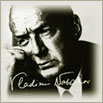
Vladimir Nabokov
(1899—1977)
Speak, Memory

Vladimir Nabokov
(1899—1977)
Speak, Memory
|
I witness with pleasure the supreme achievement of memory, which is the masterly use it makes of innate harmonies when gathering to its fold the suspended and wandering tonalities of the past. I like to imagine, in consummation and resolution of those jangling chords, something as enduring, in retrospect, as the long table that on summer birthdays and namedays used to be laid for afternoon chocolate out of doors, in an alley of birches, limes and maples at its debouchment on the smooth sanded space of the garden proper that separated the park and the house. I see the tablecloth and the faces of seated people sharing in the animation of light and shade beneath a moving, a fabulous foliage, exaggerated, no doubt, by the same faculty of impassioned commemoration, of ceaseless return, that makes me always approach that banquet table from the outside, from the depth of the park —as if the mind, in order to go back thither, had to do so with the silent steps of a prodigal, faint with excitement. Through a tremulous prism, I distinguish the features of relatives and familiars, mute lips serenely moving in forgotten speech. I see the steam of the chocolate and the plates of blueberry tarts. I note the small helicopter of a revolving samara that gently descends upon the tablecloth, and, lying across the table, an adolescent girl's bare arm indolently extended as far as it will go, with its turquoise-veined underside turned up to the flaky sunlight, the palm open in lazy expectancy of something —perhaps the nutcracker. In the place where my current tutor sits, there is a changeful image, a succession of fade-ins and fade-outs; the pulsation of my thought mingles with that of the leaf shadows and turns Ordo into Max and Max into Lenski and Lenski into the schoolmaster, and the whole array of trembling, transformations is repeated. And then, suddenly, just when the colors and outlines settle at last to their various duties —smiling, frivolous duties —some knob is touched and a torrent of sounds comes to life: voices speaking all together, a walnut cracked, the click of a nutcracker carelessly passed, thirty human hearts drowning mine with their regular beats; the sough and sigh of a thousand trees, the local concord of loud summer birds, and, beyond the river, behind the rhythmic trees, the confused and enthusiastic hullabaloo of bathing young villagers, like a background of wild applause. |
||
|
. . .
|
|
Vladimir
Nabokov (1899-1977); novelist, poet, scholar, translator, and lepidopterist
(he enjoyed chasing and collecting butterflies). A cosmopolitan Russian-born
émigré whose linguistic facility, erudite style, and eloquent prose
helped to establish him as one of the most brilliant and respected literary
figures of the 20th century. Nabokov's best-known novel, Lolita (1955),
shocked many people but its humor and literary style were praised by
critics. Nabokov produced literature and scholarship of beauty, complexity,
and inventiveness in both Russian and English. Nabokov himself used
to say "My head speaks English, my heart speaks Russian and my
ear speaks French". *Synaesthesia:
Vladimir Nabobov was a synesthete, as was also his mother,
his wife, and his son Dimitri.
|